Online Safety Tips: Protecting Your Personal Information In 2024
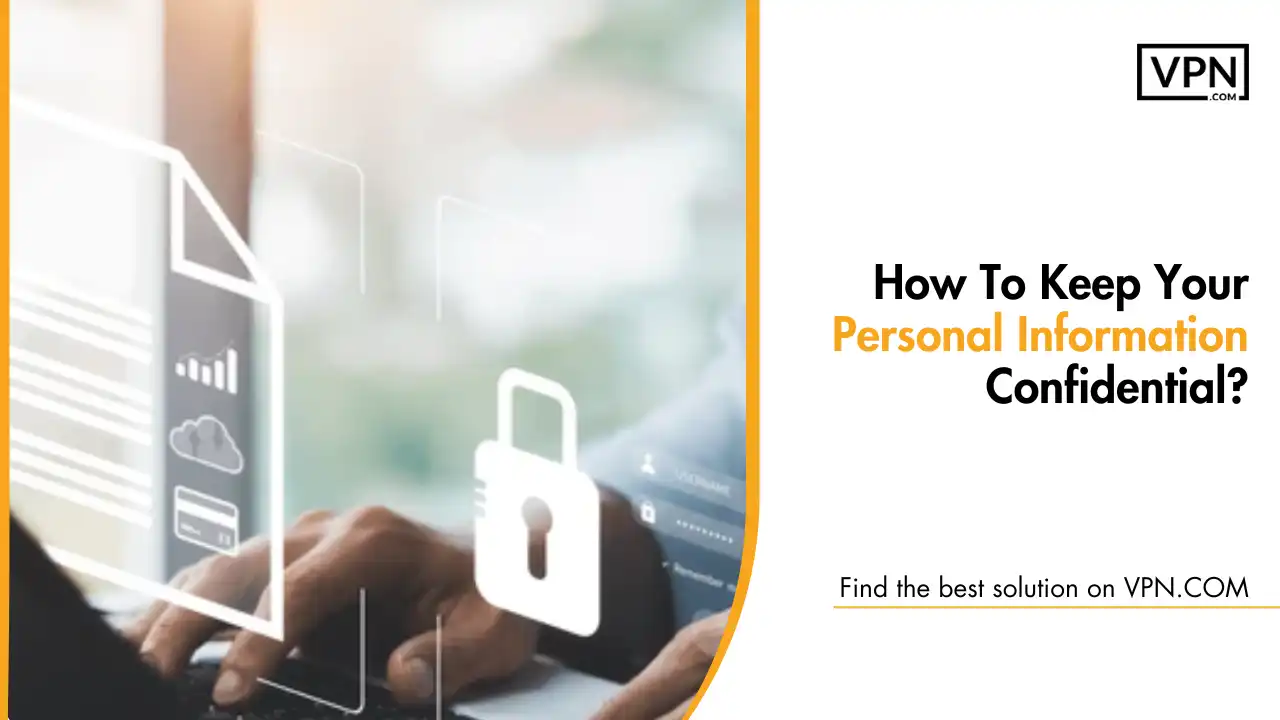
In today’s world, keeping personal information safe is hard work. As we are dependent on online services and work from home, our sensitive data gets passed around and stored on different networks and devices.
Data breaches can cause serious privacy problems. These problems can have a serious impact on people’s lives. It can cause harm to people’s professional and personal matters. And it is dangerous like identity theft, financial loss, and damage to your reputation. A report from IBM in 2022 stated that the average global cost of a data breach is a huge .35 million.
To protect your info and reduce the risk of data breaches you need to a lot of effort. To stay protected from dangerous threats. You need to understand the importance of data confidentiality in order to acquire the best methods to secure your data and personal information.
Don’t let your official or personal information get into the wrong hands. We will discuss what is personal information and will provide you with the necessary information on how to keep yourself and your organization safe from the harmful effects of data breaches.
Keeping Important Information Safe
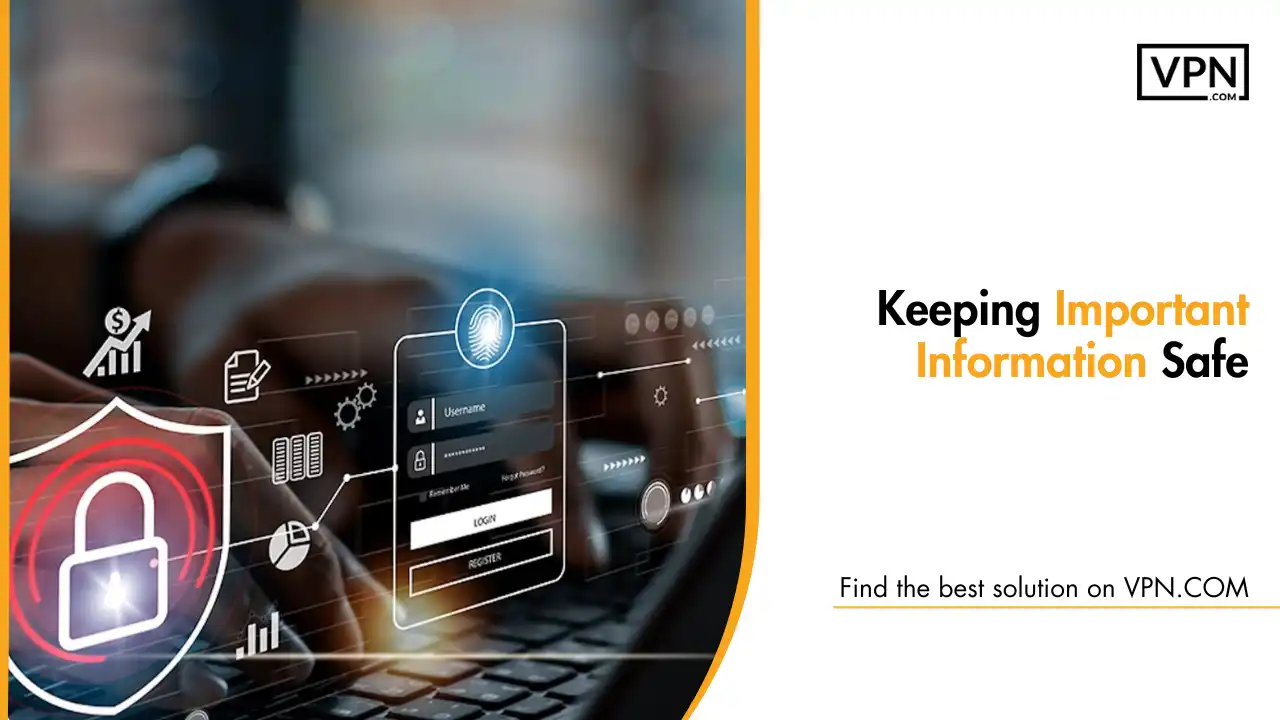
What is Data Confidentiality?
Data confidentiality is known as keeping your personal information safe and secured from suspicious people. These people shouldn’t see or use it. It aims to put security steps in place so that only the right people or systems can access confidential data.
Keeping data confidential is important for security purposes. Also for making sure it’s complete and always available when needed.
Types of Important Information
There are different examples of personal information. It depends on the situation. Some common types are:
- Personal details like names and birthdates
- Money-related info like bank details
- Health Records
- Business secrets
- Government documents
Laws for Keeping Personal Information Safe
Different countries have laws to keep important information safe. These laws have rules for handling data. There are penalties for not following the rules. Some examples are:
- The GDPR in Europe
- The CCPA in the USA
- The PIPEDA in Canada
- The Privacy Act in Australia
Businesses dealing with sensitive data must follow these laws. This avoids legal trouble and keeps customers’ trust.
Dangers to Your Personal Information
Bad People and Breaking into Computers They can use:
- Bad software to sneak into computers
- Tricks to make you share secrets
- Guessing passwords or codes
- Finding and using weak spots in software
Problems from Inside
These can come from workers or partners. They might:
- Look at secret data without permission
- Steal important info or customer details
- Mess up systems or data
- Accidentally show personal information
Mistakes That Leak Data
This happens when:
- Cloud storage or databases aren’t set up right
- WiFi isn’t secure
- Devices get lost or stolen
- Secret papers aren’t thrown away properly
Tricks to Get Personal Information
These tricks fool people into:
- Sharing secrets
- Giving access to secure systems
- Pretending to be someone important or trusted
- Making you feel rushed or like you’ll miss out
- Using your pride, greed, or curiosity
- Taking advantage of trust and social rules

Get Started w/ NordVPN Today
- Top-rated VPN for OS unknown
- Ultra-fast speed in US in 2024
- Save 69% off with VPN.com Discount
- Plans starting at $2.99/month
GUARANTEE
Best Ways to Keep Your Personal Information Safe
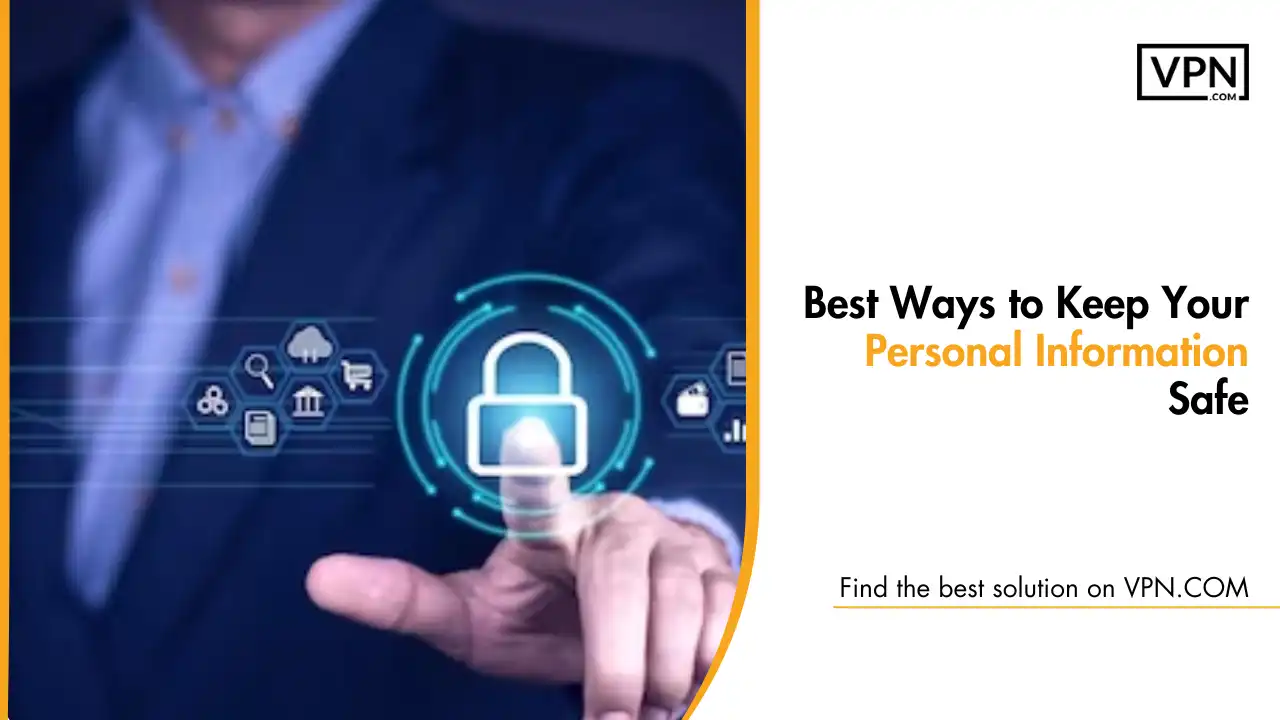
Use Strong and Special Passwords
- Make passwords at least 12 characters long
- Use a mix of big and small letters, numbers, and symbols
- Don’t use easy-to-guess things like birthdays or pet names
- Use a different password for each account
Add an Extra Check
Two-factor authentication (2FA) means using a second way to prove it’s you, like:
- Codes sent to your phone or email
- Fingerprints or face scans
- Special keys or tokens
- 2FA makes it much harder for bad people to get into your accounts.
Keep Everything Up to Date
- Turn on automatic updates for software and operating systems
- Install updates right away when asked
- Check for and install updates on all your devices
Be Careful What You Share Online
- Don’t put too much personal info on social media
- Change privacy settings to control who sees your posts and profile
- Be careful of strangers asking for personal info
- Don’t share sensitive things like social security numbers online
Use Safe Networks
Public WiFi, like in cafes or airports, isn’t always secure. To stay safe:
- Don’t log into important accounts or enter personal info on public WiFi
- Use a VPN to encrypt your internet connection
- Make sure websites use HTTPS before entering sensitive data
- Turn off auto-connect to public WiFi on your devices
Keep an Eye on Money Stuff
Watch your financial accounts and credit reports to spot any bad activity fast. You should:
- Check bank and credit card statements for fishy transactions
- Set up alerts for weird account activity
- Look at your credit reports every year for signs of fraud
- Think about using identity theft protection services
Keeping Your Devices Safe
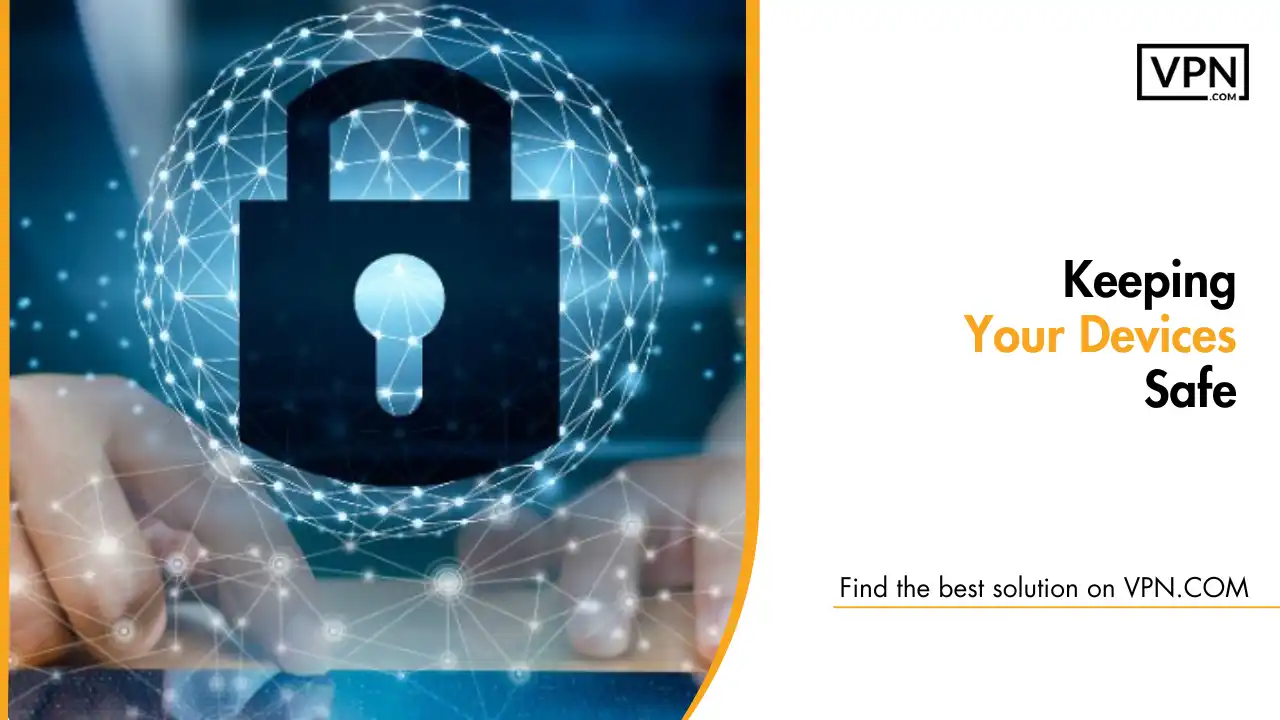
Lock Up Your Data
Encrypting your devices and data protects your data and makes an extra layer of safety. If they get lost or stolen then your data will be protected. It scrambles the data so no one can read it without the key. Here’s how:
- Turn on full encryption on your computers and phones
- Use special encryption for important files and folders
- Make sure your backups and cloud storage are encrypted too
Use Protection Software
Antivirus and antimalware software help stop bad programs. These programs can infect your devices. To stay safe use the following methods:
- Put trusted protection software on all your devices
- Keep the software updated with the latest virus info
- Scan your devices often to find and remove any threats
Secure Your Phone
Phones have a lot of personal information, so they’re a big target for thieves and hackers. To keep yours safe:
- Set a strong passcode or password
- Use fingerprint or face unlock for extra security
- Make your phone lock itself after a short time
- Turn on remote wiping in case your phone gets lost or stolen
Get Rid of Old Devices Safely
When you’re done with an old device, make sure to erase all your data. Just deleting files or formatting might not be enough since the data can sometimes still be recovered. To do it right:
- Use special data-erasing software that overwrites the data many times
- Take out and destroy hard drives before recycling or throwing away computers
- Think about using a professional data destruction service for really sensitive data
Keeping Personal Information Safe at Work
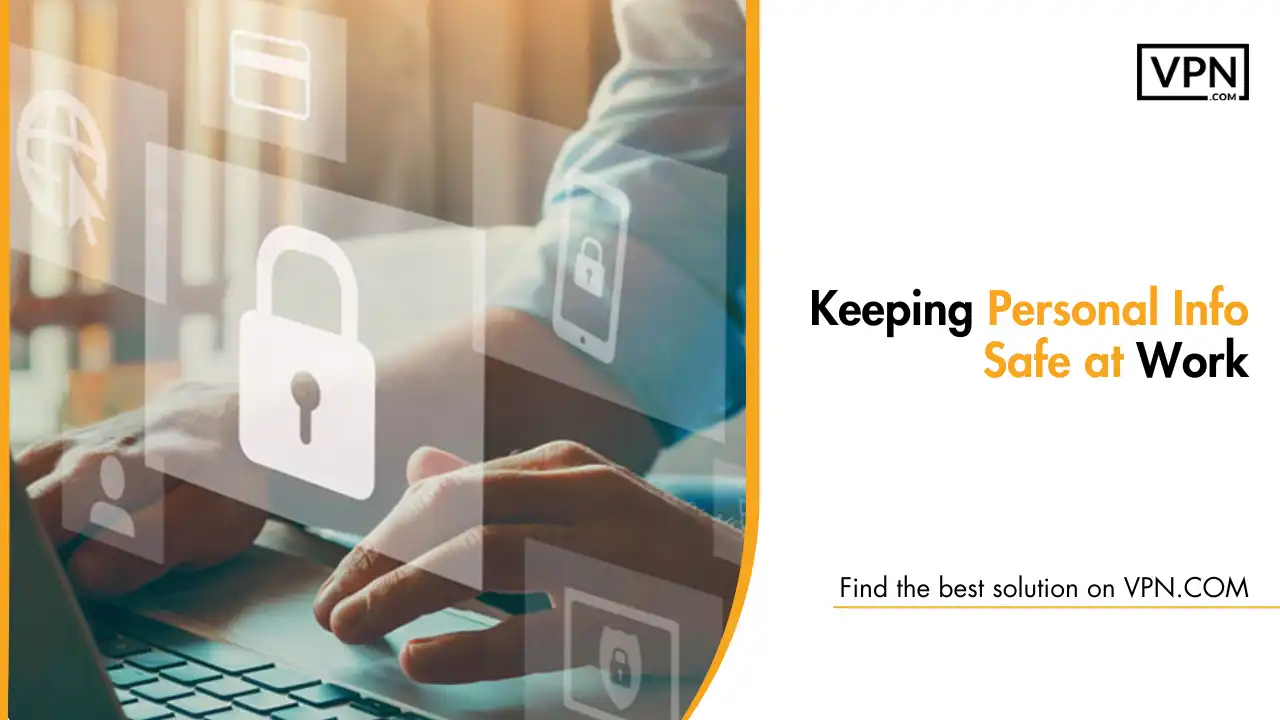
Make a Strong Plan
Companies need a good plan to keep personal and secret info safe. The plan should:
- Say what info is sensitive and how to handle it
- Set up who can see what based on their job
- Make people use strong passwords, encryption, and secure ways to talk
- Have clear steps for what to do if there’s a data leak
Teach Workers What to Do
Workers play a big part in protecting data. To make sure everyone knows what to do:
- Have regular training on security rules and how to follow them
- Show staff how to spot and report risks
- Make a work culture that cares about security
- Check-in sometimes to make sure everyone knows what to do
Only Let Some People See Sensitive Data
Only let people see sensitive data if they need it for work. To be extra safe:
- Use controls to limit access based on job roles
- Give the least amount of access needed
- Regularly check and update who can see what
- Watch for any weird activity
Use Safe Ways to Talk
When sharing sensitive info, always use safe methods like:
- Encrypted emails or secure file transfers
- I am not talking about secret stuff on public chats or social media
- Using secure video chat for meetings about sensitive things
- Teaching staff about safe ways to talk and the dangers of unsafe methods
Get Rid of Secret Papers the Right Way
To prevent the wrong people from seeing secret papers:
- Shred or burn physical papers with sensitive info
- Completely erase electronic files and storage
- Make rules for safely getting rid of secret materials
- Teach workers how to properly throw away papers and the risks if done wrong

Get Started w/ NordVPN Today
- Top-rated VPN for OS unknown
- Ultra-fast speed in US in 2024
- Save 69% off with VPN.com Discount
- Plans starting at $2.99/month
GUARANTEE
Staying Safe Online
Don’t Fall for Tricks
Phishing is when bad people try to trick you into giving them your info or getting you to download bad software. To stay safe:
- Be careful of surprise emails or messages asking for your details
- Check the sender’s email and website links closely for anything that looks wrong
- Don’t click on links or download files from strangers
- If you’re not sure, call the company or person using a number you trust to check if they sent the message
Make Your Social Media Private
Social media is a big target for thieves looking for personal info. To protect yourself:
- Check your privacy settings so only friends can see your posts and private info
- Think before accepting friend requests from people you don’t know
- Don’t post things like your birthday or home address
- Be careful about sharing strong opinions or personal stuff
Be Smart About What You Share
Be careful on other websites too, like forums or online stores. To keep your info safe:
- Use a nickname instead of your real name when you can
- Don’t share too many personal details that could identify you
- Be careful of online quizzes or surveys asking for personal info
- Use different email addresses for different online things to lower risks
Use a VPN for Extra Safety
A VPN encrypts your internet connection to keep your data safe from hackers, especially on public WiFi. To use a VPN right:
- Choose a VPN you can trust that doesn’t keep records of what you do online
- Make sure it uses strong encryption like OpenVPN or IKEv2
- Always turn on your VPN before logging into important accounts or typing in sensitive info
- Remember, a VPN might slow your internet a bit and isn’t perfect for everything you do online
What to Do When Data Gets Out?
See How Bad It Is
When data gets into the wrong hands, the first thing to do is check:
- What kind of data got out
- How many people are affected
- When and how it happened
- Which systems or databases were hit
Let People Know
After figuring out how bad it is, quickly tell the people who are affected. The message should have:
- Details about what happened and what data was involved
- What’s being done to look into and fix the problem
- Tips on how people can stay safe, like changing passwords or watching their credit
- Who to contact for more help or information
Find Out Why
Next, look closely at why the data was collected to find any weak spots. This might mean:
- Checking system logs and network traffic
- Doing a deep tech check of the affected systems
- Talking to staff or contractors who had access
- Getting help from cybersecurity experts to find out more
Stop It from Happening Again
Use what you learn from looking into it to stop similar problems in the future. This could include:
- Fixing security gaps and updating software
- Making access harder and better checking users
- Getting better at spotting and dealing with weird activity
- Updating and tightening security rules and training
- Teaching staff more about keeping data safe
By doing these things, companies can handle data breaches well and make their defenses stronger against future problems.
How Businesses Should Protect Customer Data?
Make a Strong Safety Plan
Companies that handle customer data must keep it safe from the wrong people. They should make a detailed plan that includes the following:
- Rules and steps for keeping data safe at all times
- Tech safety measures like firewalls, checking for hackers, and encryption
- Ways to manage things, like controlling who can access what and training workers
- Keeping data centers well protected and controlling who can go in
Keep Safety Measures Up to Date
As cyber threats change, companies need to stay alert to protect customer info. They should regularly:
- Look for risks and rank potential weak spots
- Test defenses by trying to break in and scanning
- Keep up with new threats by watching industry news
- Make security better based on what they find from tests and monitoring
Follow Data Protection Laws
Companies must follow data protection laws based on where they are and what they do. They should:
- Know what they have to do under these laws
- Make rules that match legal standards
- Put someone in charge of making sure the company follows the rules
- Regularly check and write down that they’re following the law and fix any problems
Encrypt and Safely Store Data
Using encryption helps keep sensitive data safe, whether it’s being sent or stored. Companies should:
- Use strong encryption for data sent over networks and stored on systems
- Keep encryption keys safe to stop unauthorized access
- Think about using special devices to handle and store keys
Be Ready for Data Breaches
Even with the best security, breaches can happen. Companies need a plan for how to respond fast and well. This plan should include:
- Clear roles and tasks for the response team
- Steps to Find, look into and control a Breach
- How to tell people affected, authorities, and the media
- Ways to look at what happened after to make security better
By doing these things, businesses can better protect their customers’ data and handle any security problems that come up.

Get Started w/ NordVPN Today
- Top-rated VPN for OS unknown
- Ultra-fast speed in US in 2024
- Save 69% off with VPN.com Discount
- Plans starting at $2.99/month
GUARANTEE
The Bottom Line
In today’s complex online world, keeping your personal and secret information safe is a big challenge. Cybercriminals are always coming up with new ways to steal sensitive data. The dangers of data breaches are constantly growing.
Protecting private data isn’t just up to individuals; it’s something we all need to work on together. We should be careful about what information we share online and follow good security practices.
Companies have a responsibility to make data security a top priority, follow all the laws and regulations, and maintain the trust of their customers to avoid costly security incidents. Don’t let your private data be stolen. Keep learning about the latest trends to help create a safer online environment for everyone.
Customer Reviews for NordVPN: In-Depth Review, Tests, and Stats
![Online Safety Tips: Protecting Your Personal Information In [year]](https://cdn.vpn.com/wp-content/themes/VPN/images/trustpilot/trustpilot_5_star.png)
Connection issues with MLB.TV
May, 2 2023
![Online Safety Tips: Protecting Your Personal Information In [year]](https://cdn.vpn.com/wp-content/themes/VPN/images/trustpilot/trustpilot_5_star.png)
Prompt customer service
May, 6 2023
![Online Safety Tips: Protecting Your Personal Information In [year]](https://cdn.vpn.com/wp-content/themes/VPN/images/trustpilot/trustpilot_5_star.png)
I would highly recommend
December, 15 2023

![Online Safety Tips: Protecting Your Personal Information In [year]](https://cdn.vpn.com/wp-content/themes/VPN/images/icons/payment-methods/mastercard.png)
![Online Safety Tips: Protecting Your Personal Information In [year]](https://cdn.vpn.com/wp-content/themes/VPN/images/icons/payment-methods/american_express.png)
![Online Safety Tips: Protecting Your Personal Information In [year]](https://cdn.vpn.com/wp-content/themes/VPN/images/icons/payment-methods/discover.png)